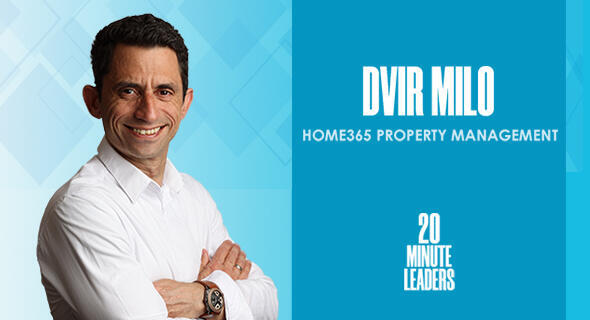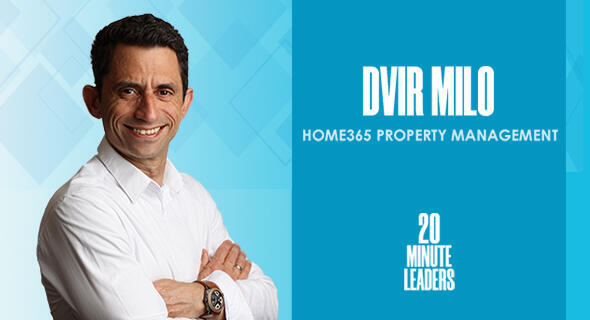
20-Minute Leaders
"In order to succeed, you need to be brave enough and to dare and to try new stuff"
Don’t develop all the features you can imagine for your product before releasing it, advises Dvir Milo, CTO of Home365.
Don’t develop all the features you can imagine for your product before releasing it, advises Dvir Milo, CTO of Home365. If you take too long or have too many features, you could miss connecting with users. Letting a product mature each year helps it become a great product, he shares. This is one of the key lessons Milo has learned in his CTO journey. He also explains that the team is crucial. Finding team players and choosing the first few core members are important to success, he says. Growing the team well also matters. Milo shares that he doesn’t hire people just to look good or show growth; he wants to be sure there is enough work for someone to do for two years before adding a position. He explains they are taking growth cautiously at Home365, which provides property management technology to improve efficiency and give owners peace of mind.
I'm excited to talk to you about two incredible companies of which you are CTO: Eventim and Home365. I want to hear what you've learned about being an engineering manager and growing and nurturing an organization from the get go.
What I learned in a nutshell in the last 13 years that I've been a CTO for growing companies is, one, you need to understand your audience and what you are trying to get in each phase. Both in Eventim and in Home365, we are changing the way that people interact. At Eventim, it was buying and purchasing entertainment or sports tickets, and in Home365, we are changing the way that people interact with their home or with their day-to-day tasks that they need to do with their home.
What I've learned is, first, to focus on your audience and what you want to achieve in every target. Second, I really believe that a product cannot be 100% perfect from the start. When it comes to your product , think big but release your features and modules in small portions, learn from your mistakes and make it better and better over time, remember great products and platform adopted fast but evolve in time not at one shot.
If we're looking at the zero to one phase where you're taking Eventim and Home365, what have you learned about tech leadership?
I am a people-person. I learned that there are a lot of great engineers, but you need strong team players in order to succeed. You cannot win by yourself. If you think that technology is a one-man-show, skip it. Try another field. For the first members of the team, try to find the guys that are doing long runs and not switching between companies every five months or one year. If you succeed in finding these core team players, the way to success is quite promising to you.
There are a lot of difficulties along the way. Not everything is smooth. Not everything works from the first try. You will fail. You need to fail in order to succeed. You need to listen. In order to succeed, you need to be brave enough and to dare and to try new stuff, to listen to your team members, and to get them to feel a part of your challenge. Once you have this core of three to five people that are going shoulder to shoulder with you with whatever your dreams are, the second stage to grow the team to 10, to 50, to 100 people will be much, much easier. The four or five first members are the most important ones that can decide if you will fail or succeed big.
How do you know when it's the right time for you to grow your team? How do you personally, in Home365, make those decisions?
I had a lot of discussion with the company CEO, Daniel Shaked, about that. This is his vision as well: not to hire people for no need. Don't do that because you need to feel responsible for people. Hire wisely , make sure the position you hire for is needed for long term and not just to make you feel good. I won't hire anyone just to make me feel good and tell my VCs or my customers or my opponent that I'm growing big to 50 for no reason, just to make me feel good.
We grew when we had the need. For example, market fit, the market loves it. Now in order to scale, we need this feature, and these 20 or 50 features. To have them fast, I need 10 or 20 new developers. If it's for a two to five month journey, I would hire a subcontractor. When I hire someone, I know in my heart that I will have at least two years of job or features to give him.
After round-B, we have the money to grow really big. But we are doing it step by step, very cautious, very mindful to people, to the real features that we want to prepare. We are not just preparing features; we are preparing our infrastructure for the next phases to scale.
Tell me about this pain point and how the technology that you're building at Home365 is making an impact there.
If you look in the property management industry, most of it is doing total manual work. It's mom and pop companies that are working with no tech. We are doing two things in this market. First of all, introduce technology. So an owner, for example, that sits in Italy and has a property in Las Vegas can take a look in his owner app. Every hour, he can see what his property made for him, what his ROI is, and what happened on the property in a way of maintenance. Imagine that you are sitting in your property as a tenant and you have a leaking sink. You try to understand who to call, first of all. The guy that gave you an offer, is it fair? With our solution, it’s end to end. The tenant has an app. Opens his app, takes a video. Our machine learning model takes the video, splits it into a lot of frames, and tries to find objects that we recognize. And also tries to find the problem from all the tenant says.
Another machine learning model tries to find the best vendors for him that are most reliable. Fair on the price, not having recurring issues after he fixed something, leave the property clean. We find the vendor. All the scheduling is done through the app. All the communication is done by technology, and an owner that sits in Italy sees everything, everything is transparent, and he feels confident that his property that he was saving for with hard work is in good hands.
The second is our business model. There are two things that bother property or real estate investors. One of them is maintenance issues. For example, a water heater that's gone broke. To replace this, it's $5,000. The second thing is vacancies. You got a mortgage or a loan to buy this property, and now you need to take out-of-pocket money and you don't have any income. With data and with a lot of algorithms that we are doing by data that we have on properties, we build a machine learning algorithm that tries to predict what is Home365’s risk in managing a property. By doing that, we can offer a peace of mind for the property owner. So we have premium plans where we offer the owners to invest and rest. We will promise you a specific return on investment. You will pay more every month, but you will have peace of mind. We are making real estate investment predictable and giving peace of mind.
It's almost a bit into the Zillow world. Leveraging different algorithms to be able to then have a meaningful engagement with real estate.
Exactly. We are between PropTech, InsureTech, and FinTech. We will guarantee, if you will have a vacant property, we will pay the rent instead of the tenant that left you. And if you have a big maintenance issue, you will pay a deductible and we will cover the rest. It gives you peace of mind. It gives you the ability to predict your ROI monthly or yearly. We remove the barriers that prevent so many people from investing in real estate.
Michael Matias, Forbes 30 Under 30, is the author of Age is Only an Int: Lessons I Learned as a Young Entrepreneur. He studies Artificial Intelligence at Stanford University, is a Venture Partner at J-Ventures and was an engineer at Hippo Insurance. Matias previously served as an officer in the 8200 unit. 20MinuteLeaders is a tech entrepreneurship interview series featuring one-on-one interviews with fascinating founders, innovators and thought leaders sharing their journeys and experiences.
Contributing editors: Michael Matias, Megan Ryan














